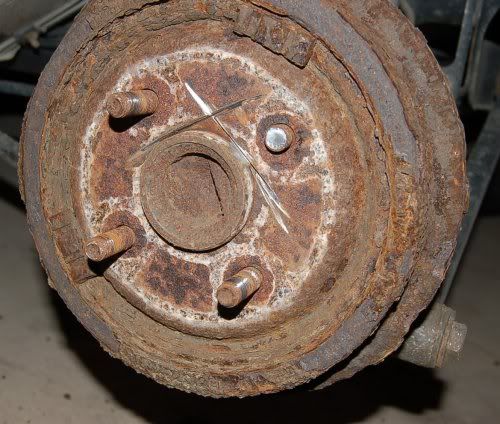...and we're near the end. Snapped one off in the front and one in the rear, another in the rear doesn't give me confidence. 95 Saturn, almost 14 years old, maybe more if you count date of manufacture.
I thought I looked cool last winter running without hubcaps with my steel wheels and snow tires, wonder if my open ended lugnuts provided a nice place for salt to hide in the threads.
They sounded really creaky last spring, and the tire iron bounced on break-loose. I can imagine the studs just twisting and untwisting repeatedly. I hand torque and a tire/wheel probably comes off three times a year... snow/summer changeovers plus one "other" bit of maintenance.
I never do any of that fancy stuff like brushing rust off the studs, because the nuts going on go on smooth: The loosening and removal "retaps" the studs enough IMO. (but am rethinking now.)
So I swallowed my pride and after >5 years of doing all my own work I'm going to a mechanic with a torch to "somehow" get my rear brake drums off and fix my stud... and, perhaps, all of them. That drum's been rusted on there for a while, there's no rim to hammer off, it crumbled away, so it'll be good to renew everything in the rear...
I thought I looked cool last winter running without hubcaps with my steel wheels and snow tires, wonder if my open ended lugnuts provided a nice place for salt to hide in the threads.
They sounded really creaky last spring, and the tire iron bounced on break-loose. I can imagine the studs just twisting and untwisting repeatedly. I hand torque and a tire/wheel probably comes off three times a year... snow/summer changeovers plus one "other" bit of maintenance.
I never do any of that fancy stuff like brushing rust off the studs, because the nuts going on go on smooth: The loosening and removal "retaps" the studs enough IMO. (but am rethinking now.)
So I swallowed my pride and after >5 years of doing all my own work I'm going to a mechanic with a torch to "somehow" get my rear brake drums off and fix my stud... and, perhaps, all of them. That drum's been rusted on there for a while, there's no rim to hammer off, it crumbled away, so it'll be good to renew everything in the rear...




